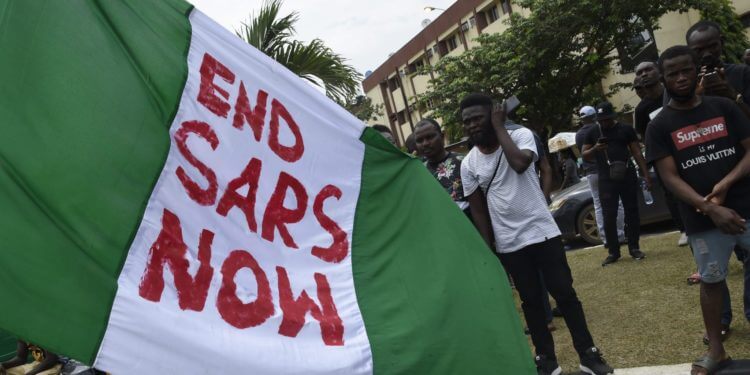Over the past few weeks, Nigeria, Africa’s most populous country, has rocked both local and international news over protests of the widely-criticized police unit, Special Anti-Robbery Squad (SARS). The Unit has been accused of police brutality and human rights abuses.
Background of SARS
The Special Anti-Robbery Squad (SARS) was formed in 1992 to target violent crimes such as armed robbery, kidnapping, car snatching, and crimes involving firearms. The squad was created with some members patrolling streets in plain clothes and some in facemask to perform undercover operations. However, over the years, SARS has been accused of several human rights violations which include sexual harassment against women, illegal stop and search, illegal arrests and detention, assault and battery, extortion, and in some cases killing of young Nigerians. Hence the commencement of the #endsars campaign.
In March 2017, Amnesty International noted that a 23-year-old Miracle in Neni, Anambra State was arrested and detained for 40 days by SARS officers for stealing a laptop. He was then tortured and barely given any food during his 40 days in detention before he was charged and brought before a court.
Miracle recounted
“…their leader directed them to go and hang me. They took me to the back of the hall and tied me with ropes. Then they started using all manner of items to beat me, including machetes, sticks, inflicting me with all kinds of injuries. One of the officers used an exhaust pipe to hit me on my teeth, breaking my teeth. I was left on that hanger for more than three hours…”
Also, in October 2018, Sunday Bang a 24-year-old amateur boxer was arrested in his home in Abuja, by SARS officials and kept in detention for 5 weeks. He was accused of robbery and was not allowed access to his family, friends, and lawyer. In their custody, Sunday was said to have suffered bone fractures due to torture.
According to Amnesty International,
“young people between the ages of 17 and 30 are most at risk of arrest, torture, or extortion by SARS.”
At least 82 alleged cases of “torture, ill-treatment, and extra-judicial execution” between January 2017 and May 2020 by SARS were recorded in June by Amnesty International.
#EndSARS campaign
In 2017, a social activist in Nigeria named Segun Awosanya together with other activists convened the #EndSARS campaign on Twitter and took to the street in protests.
What broke the camel’s back this past few weeks and caused a resurgence of the campaign in an all-out force was a video that circulated on social media of a man being killed by police officers of the Special Anti-Robbery Squad in Ughelli, a town in southern Delta state. Nigerian officials claimed the video was a fake which incited even more outrage.
Nigerian celebrities as well as other celebrities across the globe joined the movement and stood in solidarity with their Nigerian brothers.
“We are not scared to speak,” said Wizkid at a protest in London. “Nigerian youth, don’t let anyone tell you, you don’t have a voice,” said Mr. Eazi also at the protest in London.
US rapper Kanye West joined the campaign by tweeting “I stand with my Nigerian brothers and sisters to end police brutality; the government must answer to the people’s cries #EndPoliceBrutalityinNigeria.”
Also, American gospel Kirk Franklin showed his support by sending a message via Instagram which reads “For over 20 years, Nigeria stood with me, now I stand with you. #endsarsnow.”
On Sunday, 11th October protests had erupted across other countries such as Canada, England, Germany, and the United States.
During the week’s long protests, it has been estimated that at least 56 people died with several others injured. On Tuesday, October 20, Nigerian authorities also came out to say that nearly 2,000 prisoners broke out of prison due to crowd attacks on two prisons.
Stemming from the unrest, the Inspector-General of Police deployed anti-riot police to strengthen security around Nigerian prisons.
“The force will henceforth exercise the full powers of the law to prevent any further attempt on lives and property of citizens,” a police statement read.
Segun Awosanya withdraws from #EndSARS
Segun Awosanya, a social activist who pioneered the #EndSARS movement has withdrawn from the campaign. According to Segun Awosanya the sanctity of the movement had been tarnished, citing insurrection.
“Staging coordinated attacks on prominent reform advocates, and then using a credible advocacy’s campaign to raise funds through an unregistered NGO, threatening the integrity of our nation and gunning for youth insurrection in the name of #EndSARS,” Mr. Awosanya said. “Is this even sane?” he added.
Crowdfunding
A Nigerian feminist group and NGO, Feminist Coalition, established to fight justice has raised over NGN37 million (US$97,125 given current rates) in crowdfunding for the #EndSARS protest. The figure indicates a 487.8% increase from NGN6,354,561.27.
In a tweet by the group, 31.6% of the total amount raised so far had been disbursed with the following remaining balance.
• NGN 25,544,649.48
• USD 11,474.34
• CAD 5,595.89
• GBP 5,733.49
• EUR 875.42
• GHS 1,256.70
The next step
SARS has been currently dissolved thanks to the fearless youth that blazed the streets of Nigeria and across the world.
“The disbanding of SARS is only the first step in our commitment to extensive police reforms,” said President Buhari in a televised statement.
“We will also ensure that all those responsible for misconduct are brought to justice.” He further said.
Despite the dissolution, protests continue, with many seeking a total reform in the police institutions.
Another hashtag (#EndSwat) is also on the move.











